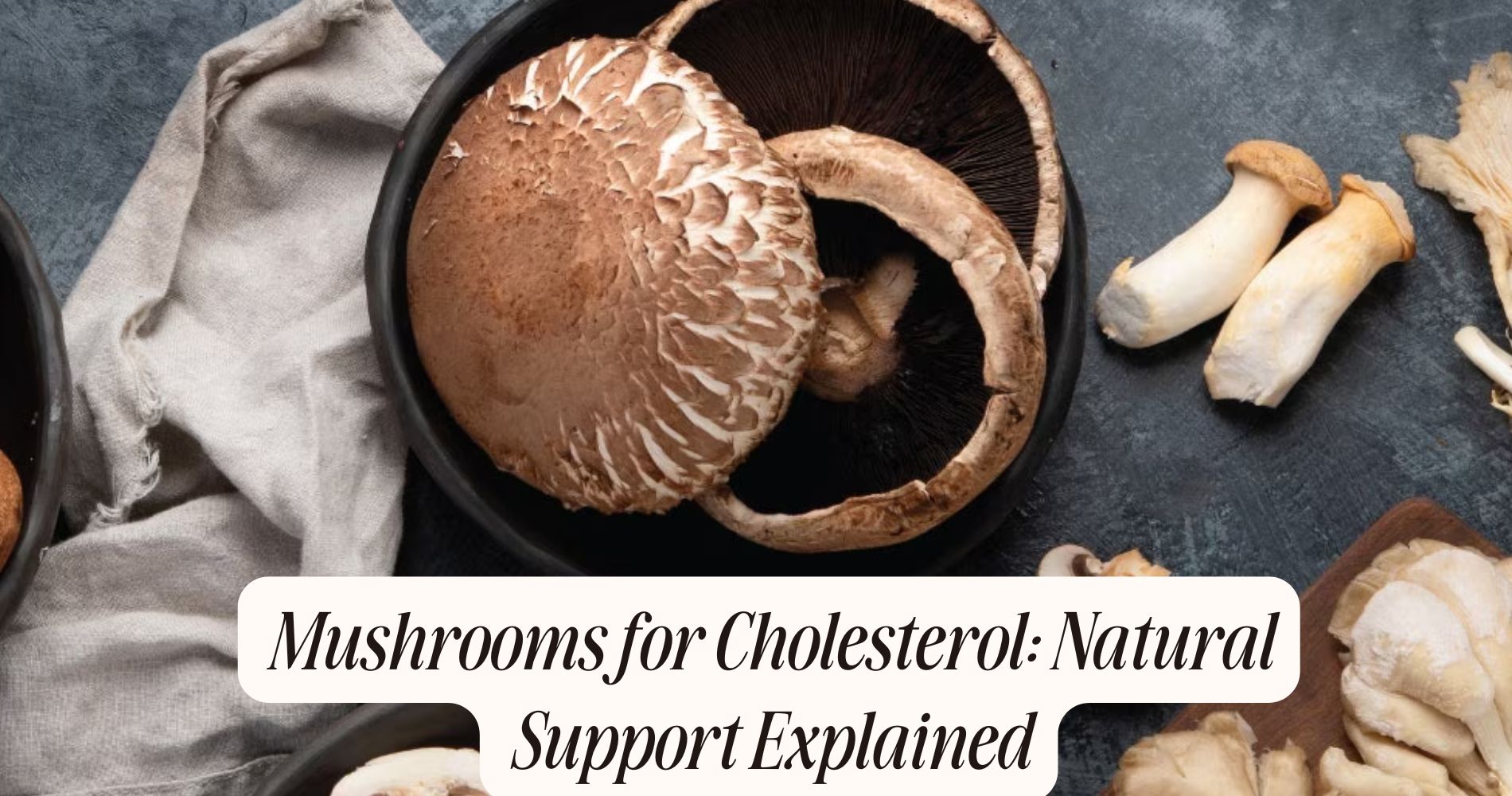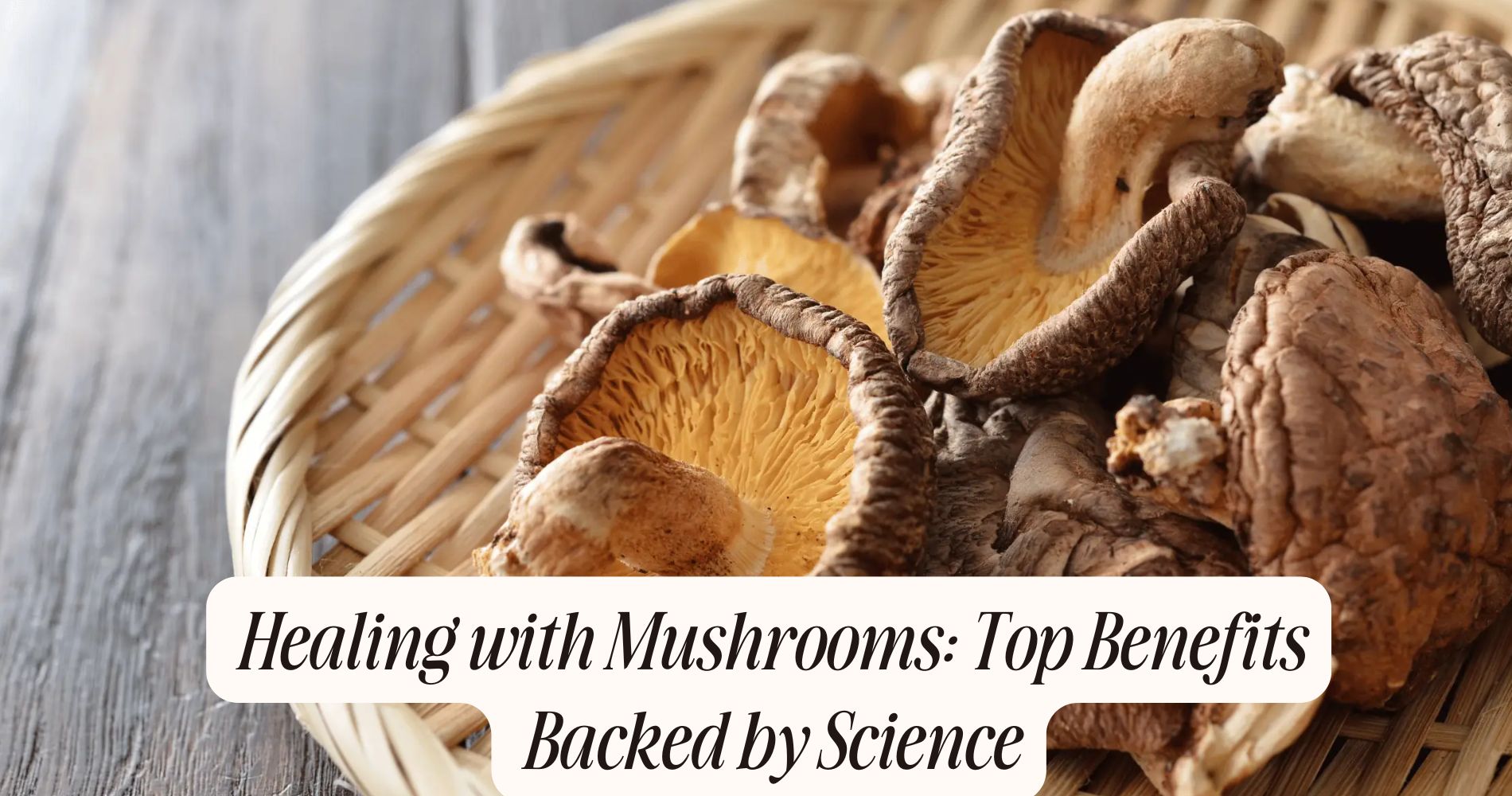
Mushrooms for Cholesterol: Natural Support Explained
Understanding Cholesterol Levels
Understanding your cholesterol levels is vital for maintaining heart health. You need to know the different cholesterol types: LDL (low-density lipoprotein) and HDL (high-density lipoprotein).
LDL is often referred to as "bad" cholesterol because it can build up in your arteries, increasing your risk for heart disease. On the other hand, HDL is considered "good" cholesterol; it helps remove LDL from your bloodstream.
To effectively manage your cholesterol, you should regularly check your levels and aim for a balance between these types. Ideally, you want low LDL and high HDL levels. This balance can greatly impact your overall cardiovascular health.
Incorporating lifestyle changes can also help. Focus on a diet rich in fruits, vegetables, and whole grains while limiting saturated fats and trans fats.
Regular exercise is another vital aspect of cholesterol management. Even simple activities like walking can boost your HDL levels and improve your heart health.
Nutritional Profile of Mushrooms
Mushrooms are a powerhouse of nutrients that can play a significant role in a balanced diet. These fungi come in various mushroom varieties, each offering unique flavors and health benefits. Most mushrooms are low in calories yet high in essential vitamins and minerals, making them an excellent addition to any meal.
You'll find that mushrooms are rich in B vitamins, such as riboflavin and niacin, which help your body convert food into energy. They also provide important minerals like selenium, potassium, and copper, all crucial for maintaining various bodily functions.

Furthermore, mushrooms contain antioxidants that combat oxidative stress, promoting overall well-being.
One of the standout features of mushrooms is their fiber content, particularly beta-glucans, which can support heart health by helping to regulate cholesterol levels. By incorporating different mushroom varieties into your meals, you not only enhance flavor but also boost your nutritional intake.
Whether you sauté them, add them to soups, or toss them in salads, mushrooms can contribute to your health in multiple ways. So, consider making mushrooms a staple in your diet to reap their numerous health benefits.
Types of Mushrooms Beneficial for Cholesterol
Certain types of mushrooms can greatly help manage cholesterol levels and promote heart health. Among these, shiitake mushrooms stand out due to their unique compounds. Shiitake benefits include their ability to lower LDL (bad) cholesterol, thanks to a substance called eritadenine. This compound helps the body metabolize fats more effectively, leading to improved cholesterol profiles.
Oyster mushrooms are another excellent choice for supporting heart health. They contain beta-glucans, a type of soluble fiber that can help reduce cholesterol absorption in the gut. By incorporating oyster mushrooms into your meals, you not only enjoy their delicious flavor but also contribute to better cholesterol management.
Both shiitake and oyster mushrooms are versatile and can be added to various dishes. You can sauté them, toss them in salads, or use them in soups and stews.
Regularly including these mushrooms in your diet might make a significant difference in your cholesterol levels and overall cardiovascular health. So, consider giving shiitake and oyster mushrooms a regular spot on your plate for a tasty way to support your heart.
How Mushrooms Affect Cholesterol
While you mightn't think of mushrooms as a cholesterol-lowering food, they actually play a significant role in managing cholesterol levels. Various mushroom varieties contain compounds that can positively influence your cholesterol profile.
For instance, certain types, like shiitake and maitake, are known for their ability to inhibit cholesterol absorption in the intestines. When you include these mushrooms in your diet, you may find that they help lower your LDL (bad cholesterol) while promoting HDL (good cholesterol).

Their fiber content also supports heart health by aiding digestion and promoting overall wellness. Moreover, mushrooms are low in calories and high in nutrients, making them an excellent addition to your meals without the worry of added fats.
The Role of Beta-Glucans
Beta-glucans, found abundantly in various mushroom species, are powerful compounds that can greatly impact cholesterol levels. These soluble fibers work by binding to cholesterol in your digestive system, helping to reduce overall levels in your bloodstream.
When you incorporate mushrooms rich in beta-glucans into your diet, you're not just supporting your cholesterol management; you're also tapping into a host of other health benefits.
One of the key beta glucans benefits is their ability to enhance immune support. By stimulating your immune system, these compounds help your body defend itself against various illnesses while promoting overall health.
This dual action—lowering cholesterol and boosting immunity—makes mushrooms an excellent addition to your diet.
Moreover, consuming mushrooms regularly can help you maintain a healthy heart. By improving your lipid profile, beta-glucans contribute to a reduction in cardiovascular risks.
Antioxidants in Mushrooms
Mushrooms are packed with antioxidants that play an essential role in combating oxidative stress in your body. This oxidative stress can lead to chronic diseases, including heart disease, which is where mushrooms can make a difference.
Different mushroom varieties, like shiitake, maitake, and reishi, are known for their impressive antioxidant properties. These compounds help neutralize free radicals, reducing damage to your cells.

When you include mushrooms in your diet, you're not just enjoying their unique flavors; you're also reaping the benefits of their health-boosting antioxidants. For instance, the ergothioneine found in many mushrooms acts as a powerful antioxidant, protecting your cells from oxidative damage.
Additionally, mushrooms like porcini and oyster mushrooms contain selenium, another crucial antioxidant that supports your overall health.
Incorporating various mushroom varieties into your meals gives you a diverse range of antioxidants, enhancing your ability to fight oxidative stress.
Incorporating Mushrooms Into Your Diet
To enjoy the health benefits of mushrooms, it's easy to incorporate them into your daily meals. Start by exploring different mushroom varieties, like shiitake, portobello, and cremini. Each offers unique flavors and health benefits, making them versatile additions to your diet. You can toss them into salads for extra texture or sauté them with vegetables as a side dish.
For breakfast, consider adding chopped mushrooms to your omelet or scrambled eggs. They pair wonderfully with cheese and herbs, enhancing the dish's nutritional value.
If you're a fan of soups, mushrooms can be a hearty ingredient. Just slice them up and let them simmer in your favorite broth.
Another great way to achieve dietary integration is by blending mushrooms into sauces or dips. This not only boosts flavor but also adds essential nutrients without overwhelming your taste buds.
You could even experiment with mushroom-based products, like powders or extracts, to sprinkle on various dishes.
With these simple ideas, you'll find it effortless to enjoy the diverse world of mushrooms while supporting your cholesterol management goals.
Cooking Methods for Maximum Benefits
When it comes to cooking mushrooms, the method you choose can make a big difference in flavor and health benefits.
Sautéing enhances their taste, while grilling helps retain nutrients, and steaming offers great health perks.
Let's explore how each method can maximize the benefits of mushrooms for cholesterol management.
Sautéing for Flavor Enhancement
Sautéing mushrooms not only enhances their natural flavors but also makes them a delicious addition to any dish aimed at managing cholesterol. When you use proper sautéing techniques, like controlling the heat and adding a splash of broth or olive oil, you'll reveal the rich, umami taste that complements various meals.
Try experimenting with different flavor pairings to elevate your dishes. For instance, mushrooms pair beautifully with garlic, herbs like thyme or rosemary, and even a hint of lemon juice. These combinations not only heighten the taste but also offer additional health benefits.

To sauté mushrooms effectively, start by heating your pan over medium heat, adding a small amount of oil to prevent sticking. Once the oil is hot, toss in the sliced mushrooms, stirring frequently to guarantee even cooking. You'll know they're ready when they turn golden brown and tender.
Incorporating sautéed mushrooms into your meals can be as simple as adding them to salads, pastas, or grain bowls. This technique not only enhances flavor but also aligns with your goals for better cholesterol management.
Enjoy the delicious benefits of sautéed mushrooms today!
Grilling for Nutrient Retention
Grilling mushrooms can be a fantastic way to not only enhance their flavor but also retain their nutrients, making them an excellent choice for those focused on cholesterol management. When you use proper grilling techniques, you can maximize the benefits of mushrooms while enjoying their rich taste.
Start by choosing fresh, high-quality mushrooms, as they're packed with essential nutrients. Preheat your grill to medium-high heat, and lightly brush your mushrooms with a bit of olive oil. This not only helps prevent sticking but also aids in flavor preservation.
Avoid overcooking them; a few minutes on each side is usually enough to achieve that perfect char while keeping their nutrient profile intact.
Consider marinating your mushrooms beforehand to boost their flavor even more. Simple marinades made from herbs, garlic, and a splash of balsamic vinegar can enhance both taste and health benefits.
Remember to use a grill basket or skewers for smaller varieties to prevent them from falling through the grates. By mastering these grilling techniques, you can enjoy delicious mushrooms that support your cholesterol management goals without sacrificing their nutritional value.
Steaming for Health Benefits
Steaming mushrooms is one of the healthiest cooking methods you can choose, especially for cholesterol management. This technique preserves essential nutrients that are often lost in other cooking methods, such as frying or boiling. When you use steaming techniques, you keep the mushrooms tender while enhancing their natural flavors without the need for excess oil or fat.
One of the key health advantages of steaming is that it helps maintain the antioxidant properties of mushrooms. Antioxidants play a significant role in reducing inflammation and oxidative stress, which are linked to various heart diseases.
Furthermore, steaming allows you to enjoy the full range of beneficial compounds found in mushrooms, such as beta-glucans, which can support healthy cholesterol levels.
To maximize these health benefits, consider steaming your mushrooms lightly—just enough to soften them while still retaining their texture. This method can easily be incorporated into your meals, whether you're adding them to salads, stir-fries, or soups.
Research Studies on Mushrooms and Cholesterol
As researchers explore the connection between mushrooms and cholesterol, they've uncovered promising findings that could influence dietary choices. Various studies indicate that certain mushroom varieties, such as shiitake and oyster mushrooms, may play a beneficial role in cholesterol management.
These mushrooms contain compounds like beta-glucans and sterols, which have been shown to help lower LDL cholesterol levels while potentially raising HDL cholesterol.
In one study, participants who incorporated shiitake mushrooms into their diets experienced a notable reduction in total cholesterol levels. Researchers believe this effect stems from the ability of these mushrooms to inhibit cholesterol absorption in the intestines.

Similarly, oyster mushrooms have demonstrated cholesterol-lowering properties through their unique fiber composition, which contributes to improved gut health and metabolic function.
Incorporating a variety of mushrooms into your meals may not only enhance flavors but also support your cholesterol management efforts. As research continues, it's becoming increasingly clear that these fungi could be a delicious and effective addition to a heart-healthy diet.
Other Natural Remedies for Cholesterol
When it comes to managing cholesterol levels, you might find that several natural remedies can complement your efforts alongside mushrooms. Incorporating herbal teas like hibiscus or green tea can provide antioxidant support, helping to lower cholesterol.
Don't forget about omega 3s found in fatty fish and flaxseeds; they're great for heart health. Adding a variety of nuts and seeds to your diet not only offers healthy fats but also provides essential nutrients.
Plant sterols are another powerful ally; you can find these in fortified foods or supplements. Aim to include plenty of fiber sources like oats and beans, as they help reduce cholesterol absorption.
Loading up on green vegetables like spinach and kale offers additional benefits. Consider the garlic benefits as well; it may aid in lowering cholesterol levels.
You might also want to try apple cider vinegar, known for its health perks. Cooking with avocado oil instead of saturated fats is a smart choice too.
Finally, red yeast rice is a traditional remedy that's shown promise in managing cholesterol, but consult with a healthcare provider before trying it.
Support Heart Health Naturally with SUPER MUSHROOM GUMMIES
If you’re exploring mushrooms for cholesterol management, Well Gummies' SUPER MUSHROOM GUMMIES offer a simple and effective way to enjoy their benefits. Packed with 10 functional mushroom types, these vegan gummies support heart health, boost immunity, and enhance mental clarity. With a delicious fresh wild berry flavor, they’re as convenient as they are tasty—perfect for daily use without the hassle of cooking. Enjoy balanced energy and natural wellness support without jitters or crashes. Make SUPER MUSHROOM GUMMIES part of your heart-healthy lifestyle today!
Frequently Asked Questions
Can Mushrooms Replace Cholesterol-Lowering Medications?
Mushrooms can't fully replace cholesterol-lowering medications, but incorporating various mushroom varieties into your diet can enhance your overall health. Always follow dietary recommendations from your healthcare provider for the best results in managing cholesterol levels.
Are There Any Side Effects of Consuming Mushrooms?
While most mushroom varieties are safe, some can cause allergic reactions or gastrointestinal discomfort. It's important to know their nutritional content and effects on your body, so you can enjoy them without unwanted side effects.
How Many Mushrooms Should I Eat Daily for Benefits?
To reap the benefits, you should aim for about one to two servings of various mushroom varieties daily. This amount helps incorporate their nutrients and potential health benefits into your diet effectively. Enjoy them!
Can Mushrooms Worsen Cholesterol Levels in Any Case?
Mushrooms generally won't worsen cholesterol levels, but certain mushroom varieties and cooking methods can impact their health effects. You should focus on healthier cooking options, like grilling or sautéing, to maximize their benefits.
Are There Specific Mushroom Supplements for Cholesterol Support?
If you're looking for specific mushroom supplements for cholesterol support, consider varieties like reishi or shiitake. Always check dosage recommendations, as they can vary, ensuring you get the right amount for potential benefits.
Conclusion
Incorporating mushrooms into your diet can be a delicious and effective way to support healthy cholesterol levels. With their rich nutritional profile and specific compounds like beta-glucans, these fungi offer natural benefits that can complement your overall heart health strategy. By experimenting with different types and cooking methods, you can easily enjoy their advantages. Remember, though, that mushrooms work best alongside a balanced diet and lifestyle for ideal results. So, get creative and start adding mushrooms to your meals today!




